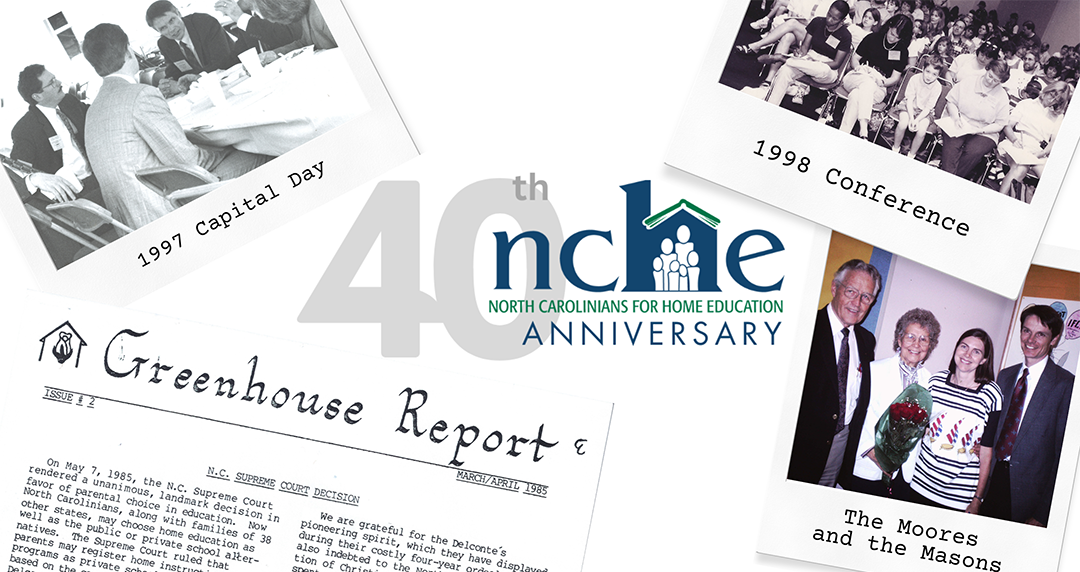Graduate 2024/Matthew McDill
North Carolinians for Home Education is celebrating our fortieth anniversary this year! This article is part two in a series that recounts the history of the modern homeschool movement in NC (see the first article in the spring issue of GREENHOUSE). We continue to express our gratitude for the hard work of NCHE leaders to support homeschool parents and to make NC a wonderful place to homeschool. It is time to remember, celebrate, and be grateful.
I’d like to continue to share portions of the series of Facebook posts that Debbie Mason wrote outlining the history of NCHE and homeschooling in NC. Debbie, our events director and media director, and her husband Spencer, our law and policy director and office administrator, have been serving on the NCHE board since the 1980s.
First Attacks on Homeschool Freedom
While the NCHE leadership was praising God for the Delconte decision, they knew they would soon be in a fight to keep the right to educate their children at home. In the March/April Greenhouse Report (mailed on May 24, 1985), they warned, “We must be more watchful than ever to protect our freedoms. Already the media, public educationists, and some legislators are saying, ‘Now that it’s legal, we need to regulate it.’” In the same issue, NCHE encouraged homeschoolers to work to keep the then-current law unchanged, to comply with the law, and to keep the quality of homeschool instruction high. They also advised, “Be ready to drop everything and go to Raleigh at a moment’s notice. The battle is only beginning.”
Senator Dennis J. Winner introduced a bill to set up a study commission on home education. It was tentatively approved and went to the appropriations committee. Members of NCHE went to see the appropriations committee chairman to tell him that homeschools fell under the private school law he had championed and that we did not want this study commission. The chairman promised that the study commission would not be funded, and it was not.
About that same time, the senior associate superintendent of public schools sent a document to all superintendents of North Carolina public schools asking them to support legislation that would give the state tight regulation over homeschools. The document said that legislation should be passed to add the following changes to the existing homeschool requirements:
“1. Parent teachers must have a college education.
2. The state should set a required course of study.
3. Minimum standardized test scores should be established, and tests should be monitored by qualified personnel.
4. Parents should notify school officials of their intent to homeschool.
5. Nonpublic school legislation should be amended to require that each nonpublic school notify the appropriate local board of education of every enrollment and every dropout or dismissal that occurs during the school year. The nonpublic school should also notify authorities of anyone who does not graduate and does not return the following year.”
State officials branded home educators as fanatics who were imprisoning their children, not allowing them to come into contact with anyone whose views might be opposed to their own. They were depicted as people who had stepped out of the mainstream of America. Words such as “child neglect” and “child abuse” were used frequently by the press. State officials claimed that homeschools were poorly regulated and would stunt the educational and social growth of children. Editorial columns again carried the cry for the regulation of homeschools. One editorial suggested that a functionally illiterate parent could homeschool, and that this concern was not so far-fetched since “a distressingly high percentage of North Carolinians are functionally illiterate.” It was ironic that the accusations that so many North Carolina parents were functionally illiterate were a condemnation of the very educational system they were claiming to support.
After the Delconte case, NCHE focused on lobbying and teaching homeschoolers how to lobby. They knew that the time would come when they would have to fight in the General Assembly for their rights to homeschool. They encouraged homeschoolers to contact their legislators with these three messages:
1. North Carolina homeschoolers are committed, conscientious, law-abiding, intelligent, and friendly people.
2. Homeschools are an effective means of education.
3. Our desire is for our existing protection under the 1979 “Church School” law to be left untouched.
A Restrictive Bill
In April 1987, the Department of Public Instruction (DPI) proposed legislation entitled “An Act to Permit Home Instruction under Certain Conditions, as a Means of Complying with Compulsory School Attendance Requirements.” Under this proposed legislation, homeschools would be under the authority of DPI and local boards of education. Homeschool teachers would be required to have a college education and to teach a state-approved curriculum. This proposal also required a six-hour school day and gave the local school authorities the ability to deny permission for a family to homeschool based on a twice-a-year, subjective review of their homeschool.
As soon as NCHE heard of this potential bill, we responded immediately by asking homeschoolers to write, phone, and visit their legislators.
On April 17, 1987, Representative Tyndall introduced HB 837 for its first reading. This bill was identical to the DPI proposal. Immediately, NCHE members began to flood Raleigh with letters and calls. On April 30, Senator Marvin introduced SB 779, which was virtually identical to HB 837. Then on May 1, Senator Hardison introduced a substitute bill, SB 708, which was a proposal put forward by DNPE director Rod Helder. While SB 708 was less restrictive than HB 837 and SB 779, NCHE lobbied against it as well as the other two bills.
On May 14, both Senate bills came before the Senate Education Committee, and they were both sent to a subcommittee for additional study. By May 18, SB 779 had received an unfavorable report, and there had been no action on SB 708. From May 19 through August 11, HB 837 went through several subcommittee and committee meetings, was revised five times, and finally passed its third reading in the House. During this time, it became apparent that DPI was orchestrating the entire process.
The House passed HB 837. Because money was requested for the 1987-1988 fiscal year, it was sent to the Senate Appropriations Committee for approval. When the 1987 legislative session came to an end, HB 837 was still waiting for Appropriations Committee approval. With the State Board of Education backing these bills and HB 837 having already been passed by the House, it seemed inevitable that both bills would pass in the 1988 short legislative session.
But the story was not over. NCHE continued our efforts to defeat this bill during the off-season, and it made a difference. Several NCHE leaders volunteered countless hours lobbying the legislators, attending meetings, and keeping NCHE members informed. The sacrificial giving of their time and efforts in rallying homeschoolers from across the state saved us from having to live with an onerous homeschool law.
Debbie reflects on this time: “I remember this time of intense lobbying. It was a ton of work—letters written, phone calls made (long-distance), and trips to Raleigh. Today, we take for granted how easy communication is, but back then, there were no email or cell phones. Long distance phone calls cost money, and to get the word out, we used phone chains. Much of the work was done late at night when long distance calls were cheaper.
Look for the final installment of our history series in the next edition of the GREENHOUSE this fall. We will tell how NCHE defeated this restrictive bill and initiated the homeschool law that we live with today.




